Navigation
Install the app
How to install the app on iOS
Follow along with the video below to see how to install our site as a web app on your home screen.
Note: This feature may not be available in some browsers.
More options
You are using an out of date browser. It may not display this or other websites correctly.
You should upgrade or use an alternative browser.
You should upgrade or use an alternative browser.
The DSR Method (Dutch Synthetic Reefing)
- Thread starter glennf
- Start date
- Tagged users None
Publication1 :
I guest nature also need some PO4 and NO3 supplementing.
Did I have a foresight, when i decided to supplement both into my tank ?
Maybee i should try peeying into my tank (seriously .... this was a joke!!!)
http://www.advancedaquarist.com/blog/fish-pee-is-vital-to-reef-health
I guest nature also need some PO4 and NO3 supplementing.
Did I have a foresight, when i decided to supplement both into my tank ?
Maybee i should try peeying into my tank (seriously .... this was a joke!!!)
http://www.advancedaquarist.com/blog/fish-pee-is-vital-to-reef-health
Po4 ??? Beter use a redsea, elos or hanna phosphorus(hi736) test.
Fe test .. No problem (iron will not stay in suspension anyway). The Fe test was to make sure you're not overdosing..
I've been dosing iron for a long time, without any sign of iron creeping up and become toxic
Iron is dosing is very beneficial for the reeftank. Without that i would not have any of the results i have now.
Then tests i recommend are very common in Holland.
Look for example at dutch LFS like www.seaflower.nl
I Only know the salifert Boron test.
I've been dosing the liquid Fe for years, both Glenn's mix and my own iron (II) citrate at 1-3 ml per night.
I have tried using the Seachem iron test but can never get a reading and apparently neither can Triton
My skimmer though, tells a different story, pulling out black sludge
I also use the Salifert boron test
That was publication 2:
Now science is confirming things enthousiast reefers knew a while ago. How about that !
Guest who those reefers were.
who wants to see an ugly old fat guy?Different like you don't have an avatar different?
All iron supplements percipitate within 6 hours in saltwater.I've been dosing the liquid Fe for years, both Glenn's mix and my own iron (II) citrate at 1-3 ml per night.
I have tried using the Seachem iron test but can never get a reading and apparently neither can Triton [emoji14]

My skimmer though, tells a different story, pulling out black sludge
I also use the Salifert boron test
So no wonder you don't get any reading.
The sera iron test does OK, when you measure shortly after dosing.
Boron consumption by corals is the same ratio than sodium bicarbonate?
My idea taking the above recipe:
0,172 + 0,0254 = 0,1974 (100%)
0.172 g sodium bicarbonate = 87%
0.0254 g boric acid = 13%
Question maintain BO levels:
- Is it correct to make a solution of Alkalinity with 87% Sodium Bicarbonate + 13% Boric Acid?
For exemple: in Fauna Marin is 500g Sodium Bicarbonate to 5L change to -> 435g Sodium Bicarbonate + 65g Boric Acid
What do you think about this?
My idea taking the above recipe:
0,172 + 0,0254 = 0,1974 (100%)
0.172 g sodium bicarbonate = 87%
0.0254 g boric acid = 13%
Question maintain BO levels:
- Is it correct to make a solution of Alkalinity with 87% Sodium Bicarbonate + 13% Boric Acid?
For exemple: in Fauna Marin is 500g Sodium Bicarbonate to 5L change to -> 435g Sodium Bicarbonate + 65g Boric Acid
What do you think about this?
Randy Holmes-Farley
Reef Chemist
View Badges
Staff member
Super Moderator
Excellence Award
Expert Contributor
Article Contributor
R2R Research
My Tank Thread
- Joined
- Sep 5, 2014
- Messages
- 67,142
- Reaction score
- 63,494
Boron consumption by corals is the same ratio than sodium bicarbonate?
My idea taking the above recipe:
0,172 + 0,0254 = 0,1974 (100%)
0.172 g sodium bicarbonate = 87%
0.0254 g boric acid = 13%
Question maintain BO levels:
- Is it correct to make a solution of Alkalinity with 87% Sodium Bicarbonate + 13% Boric Acid?
For exemple: in Fauna Marin is 500g Sodium Bicarbonate to 5L change to -> 435g Sodium Bicarbonate + 65g Boric Acid
What do you think about this?
I'm not sure there's any consumption (or requirement) of boron by corals, but there might be. There's no reason to assume it is consumed at the same rate that skeletons are produced, however. It is not a significant component of coral skeletons.
IMO, you'd be adding too much. A two part missing borate will slowly drive down borate simply because it boosts salinity over time and correcting the salinity back to normal will reduce everything, including borate. We can calculate how much that is, but I can't do it right now.
- Joined
- Jan 26, 2017
- Messages
- 30
- Reaction score
- 36
The Dutch have been keeping saltwater fish longer than us Americans. All my older books from when the hobby started were translated from Dutch including my water chemistry books. I think far to much emphasis is put on water changes, but I think eventually all tanks need a water change or they will start to decline. But most tanks should be able to easily go 2 or 5 years with no changes. If your tank looks better after a water change that means your tank is on the verge of crashing because you should see no difference with new water unless your tank is declining in between changes. I change water 4 or 5 times a year, sometimes more sometimes less depending on how I feel as I have no schedules. My bacteria are doing what they are paid to do and we are just here to give the bacteria something to make fun of.
I myself am criticized constantly for using a reverse UG filter, that is because virtually no one uses them and the people who are criticizing are ignorant of how they work as they never used them. They won't openly say anything to me because none of them have a system that has lasted longer than mine but if I set this tank up today, I would be laughed out of the hobby and no one would take me seriously. Water changes or no water changes are the same thing but plenty of tanks run with no water changes and many of them look just fine. That proves that it can be done. It is a personal preference if that is how you want to run your system.
I don't have any test kits which is another reason people think I am nuts, or at least very lucky. Luck has nothing to do with it, observation is the key to this hobby but unfortunately the "knowledge" is largely driven by rumor and many of those rumors are started with people with very little experience. For instance someone will state that they eliminated hair algae with snails, slugs, Pepto Bismol or Coca Cola and in time, it becomes fact.
I cringe when I read all the ich, algae and cyano remedies and I choose to forgo entering those discussions as I am tired of hearing about garlic, cleaner wrasses, magnesium, flow and old light bulbs, all things that have nothing to do with eliminating anything except money from your wallet. :crazy:
Paul B. I would love to learn more about what you "observe" in place of testing. Can you advise any good threads?
I think one of the challenges in this hobby is that not everything stays in the water column. I have a red / brown macro algae in one tank. It starts growing and looking too healthy way before my test kits show elevation of nitrogen or phosphate. As long as it is struggling and looking a little abused, I know things are good in my tank.
When I see a bit of cyano, I know my phosphate is rising relative to my nitrogen. I've learned now to deal with it at that point. This when my nitrogen levels are, like usual, low.
Other tips and tricks regards observation would be most welcome.
Paul B. I would love to learn more about what you "observe" in place of testing. Can you advise any good threads?
Other tips and tricks regards observation would be most welcome.
I can't pick a thread out of my head right now. My head is well picked already. But just think about this. Some people never change water, like years and some of their tanks look fantastic. That means that your corals and other things can get away with not having new chemicals or removing old pollutants for quite a while. Not forever, but many people change water every week. Are they putting sewage or toxic wastes in their tanks? Do they keep whale sharks or manta rays? I don't think so, but the fact that some tanks can go for years with no water changes means it is not that important. I do believe we should change water and I also believe too many water changes is detrimental. Yes, I know that is counter from what we read but we read a lot of wrong things as 89.7% of what we think is correct came about through rumor and not by actual tests done by aquarists instead of some lab technician in a high school in Bayone New Jersey.
If your corals noticeably "perk up" after a water change there is something wrong. That means that if you did not do that water change for a few more weeks your tank would crash? Our tanks should not be living on the edge of crashing. They should also not crash if the power goes out for a day or you run out of food for a few days. Fish and corals have a huge tolerance for these things if they are healthy as they should be.
As I said someplace, I change water maybe 5 or 6 times a year. I see no change and if I don't get the time I would not worry if I couldn't get to it for a year. Nothing would happen.
It is true that tank water will slightly decline eventually, but it is also true that tank water will get healthier in time.
Why is it that new tanks with all new water look lousy? If new water was the key, why don't we change 100% of our water ever?
Notice in a tank with new water, you will see the fish hiding and maybe texting behind the rocks. Their color will be faded and I doubt anything will spawn. Why is that?
That is because bacteria and algae add healthful properties to our water. This is not printed any longer but if you read some of the old chemistry books from when the hobby started you will discover these things. Why do very old tanks have few to no problems?
Not everything can be tested for with those cheap test kits. The pheromones, chlorophyll, hormones, metals and other things accumulate in the water, some good some bad but I "think" it is more good than bad because many many years ago when we had nothing but fresh water and trilobites the first thing we read when we wanted to breed something was to use aged water and feed live foods. I didn't make that up but I am to lazy to go and look up my 50 year old books to find it.
OK I just looked in one of my books, "Water Chemistry for Advanced Aquarists" by Guido Huckstedt 1973 translated from German. The Foreword reads:
"A knowledge of chemistry is vital to all aquarium owners, as even day to day maintenance requires an understanding of such important basics as pH and hardness. Yet there are some aquarists who feel that maintaining a certain balance of water chemistry will enable them to perform miracles.
These people have failed to grasp a basic fact that is more important than any chemical facts or figures. A knowledge of techniques may be easily obtained from books and other aquarists, but practical experience can only be gained through time and exposure to the problems involved in aquarium maintenance. It is the combination of book knowledge and experience that will make a successful aquarist".
How many times do we hear, My tank is overgrown with algae and my parameters are perfect, or my tank crashed and parameters are perfect, or I quarantined everything for a year and all my fish died from ich, or cyano is covering my corals and my parameters are perfect and I increased the flow and it got worse, Or my Mother N Law wants to move in with us so can I just install a giant fish tank in our spare bedroom.
+1
another thing to consider is just how effective water changes are anyway.
when
buildup=increase or decrease of something between water changes
newwater=stuff in replacement water.
fraction=fraction of water changed (1/10,1/20 and so on)
enough water changes have been done to the value after the water change is constant water change to water change.
assuming the stuff is linear and a constant change.
the tank winds up at
afterwaterchange=newwater+buildup/fraction
so if you change 1/10 of the water each week with a buildup of 10ppm with nothing in the newwater, the tank will wind up at 100ppm. or if like calcium it will be 100ppm lower that what is in the replacement water. if the newwater has 400ppm calcium, the tank will wind up at 350ppm calcium then up to 360 and back down to 350 after the next change.
to me what is important is to change the buildup. dose calcium, balance and stabilize the tank with algae and things like that. Then the water change will have at best no effect.
my .02
another thing to consider is just how effective water changes are anyway.
when
buildup=increase or decrease of something between water changes
newwater=stuff in replacement water.
fraction=fraction of water changed (1/10,1/20 and so on)
enough water changes have been done to the value after the water change is constant water change to water change.
assuming the stuff is linear and a constant change.
the tank winds up at
afterwaterchange=newwater+buildup/fraction
so if you change 1/10 of the water each week with a buildup of 10ppm with nothing in the newwater, the tank will wind up at 100ppm. or if like calcium it will be 100ppm lower that what is in the replacement water. if the newwater has 400ppm calcium, the tank will wind up at 350ppm calcium then up to 360 and back down to 350 after the next change.
to me what is important is to change the buildup. dose calcium, balance and stabilize the tank with algae and things like that. Then the water change will have at best no effect.
my .02
- Joined
- Jan 26, 2017
- Messages
- 30
- Reaction score
- 36
I can't pick a thread out of my head right now. My head is well picked already. But just think about this. Some people never change water, like years and some of their tanks look fantastic. That means that your corals and other things can get away with not having new chemicals or removing old pollutants for quite a while. Not forever, but many people change water every week. Are they putting sewage or toxic wastes in their tanks? Do they keep whale sharks or manta rays? I don't think so, but the fact that some tanks can go for years with no water changes means it is not that important. I do believe we should change water and I also believe too many water changes is detrimental. Yes, I know that is counter from what we read but we read a lot of wrong things as 89.7% of what we think is correct came about through rumor and not by actual tests done by aquarists instead of some lab technician in a high school in Bayone New Jersey.
If your corals noticeably "perk up" after a water change there is something wrong. That means that if you did not do that water change for a few more weeks your tank would crash? Our tanks should not be living on the edge of crashing. They should also not crash if the power goes out for a day or you run out of food for a few days. Fish and corals have a huge tolerance for these things if they are healthy as they should be.
As I said someplace, I change water maybe 5 or 6 times a year. I see no change and if I don't get the time I would not worry if I couldn't get to it for a year. Nothing would happen.
It is true that tank water will slightly decline eventually, but it is also true that tank water will get healthier in time.
Why is it that new tanks with all new water look lousy? If new water was the key, why don't we change 100% of our water ever?
Notice in a tank with new water, you will see the fish hiding and maybe texting behind the rocks. Their color will be faded and I doubt anything will spawn. Why is that?
That is because bacteria and algae add healthful properties to our water. This is not printed any longer but if you read some of the old chemistry books from when the hobby started you will discover these things. Why do very old tanks have few to no problems?
Not everything can be tested for with those cheap test kits. The pheromones, chlorophyll, hormones, metals and other things accumulate in the water, some good some bad but I "think" it is more good than bad because many many years ago when we had nothing but fresh water and trilobites the first thing we read when we wanted to breed something was to use aged water and feed live foods. I didn't make that up but I am to lazy to go and look up my 50 year old books to find it.
OK I just looked in one of my books, "Water Chemistry for Advanced Aquarists" by Guido Huckstedt 1973 translated from German. The Foreword reads:
"A knowledge of chemistry is vital to all aquarium owners, as even day to day maintenance requires an understanding of such important basics as pH and hardness. Yet there are some aquarists who feel that maintaining a certain balance of water chemistry will enable them to perform miracles.
These people have failed to grasp a basic fact that is more important than any chemical facts or figures. A knowledge of techniques may be easily obtained from books and other aquarists, but practical experience can only be gained through time and exposure to the problems involved in aquarium maintenance. It is the combination of book knowledge and experience that will make a successful aquarist".
How many times do we hear, My tank is overgrown with algae and my parameters are perfect, or my tank crashed and parameters are perfect, or I quarantined everything for a year and all my fish died from ich, or cyano is covering my corals and my parameters are perfect and I increased the flow and it got worse, Or my Mother N Law wants to move in with us so can I just install a giant fish tank in our spare bedroom.
I don't do water changes, but was thinking about that whale shark I saw in my LFS ... LOL!
How about some butterflies
Doing just fine without waterchanges.
I do use UV because this is crucial to control itch.
Now 12y already without WC[emoji6]
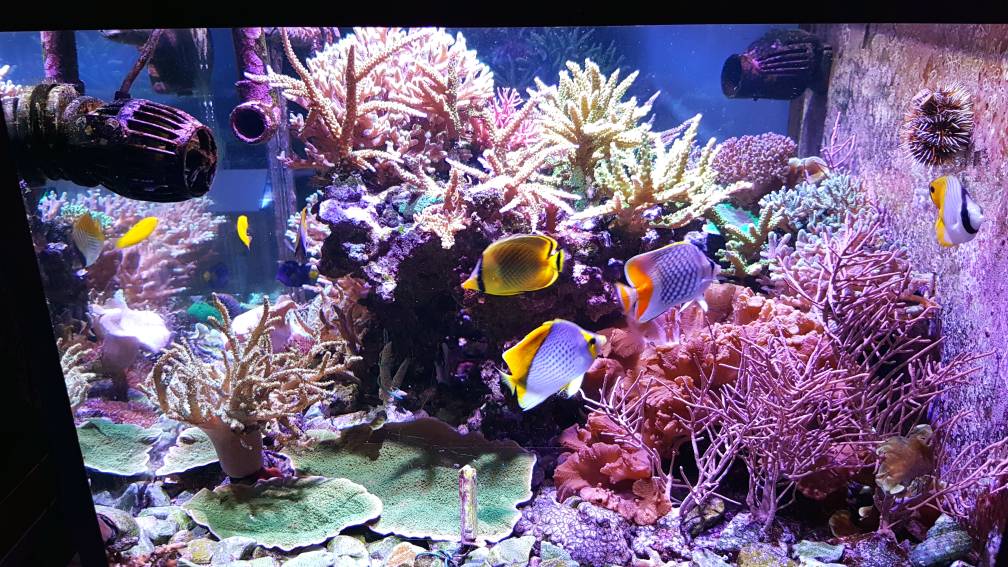
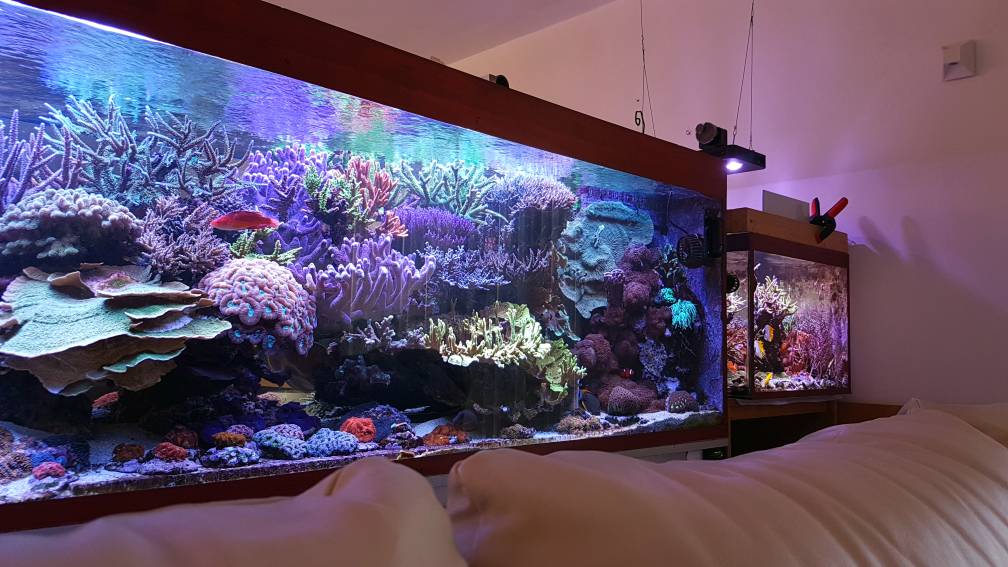
Doing just fine without waterchanges.
I do use UV because this is crucial to control itch.
Now 12y already without WC[emoji6]


Corals are thriving.
All grown from "coral waste" from my maintank
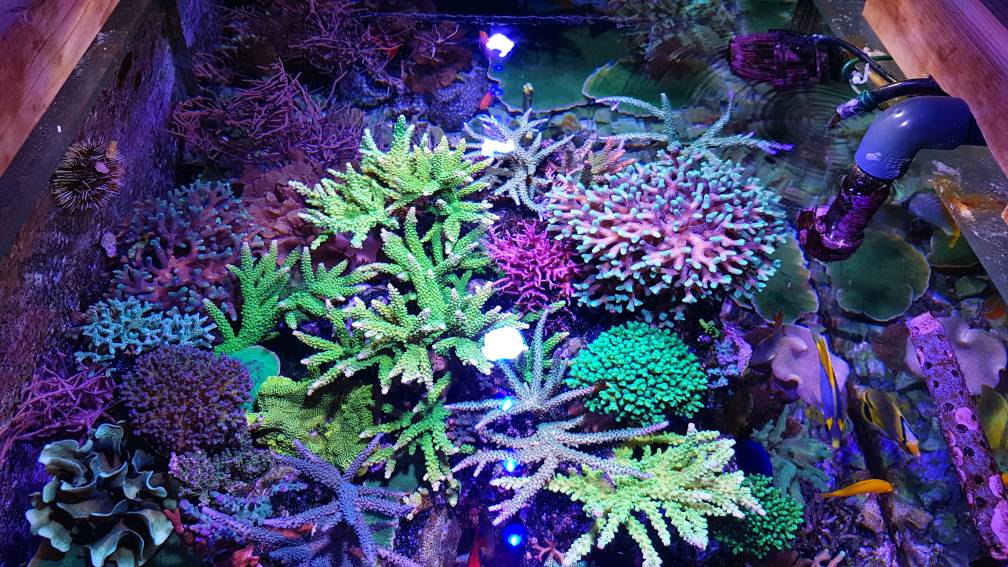
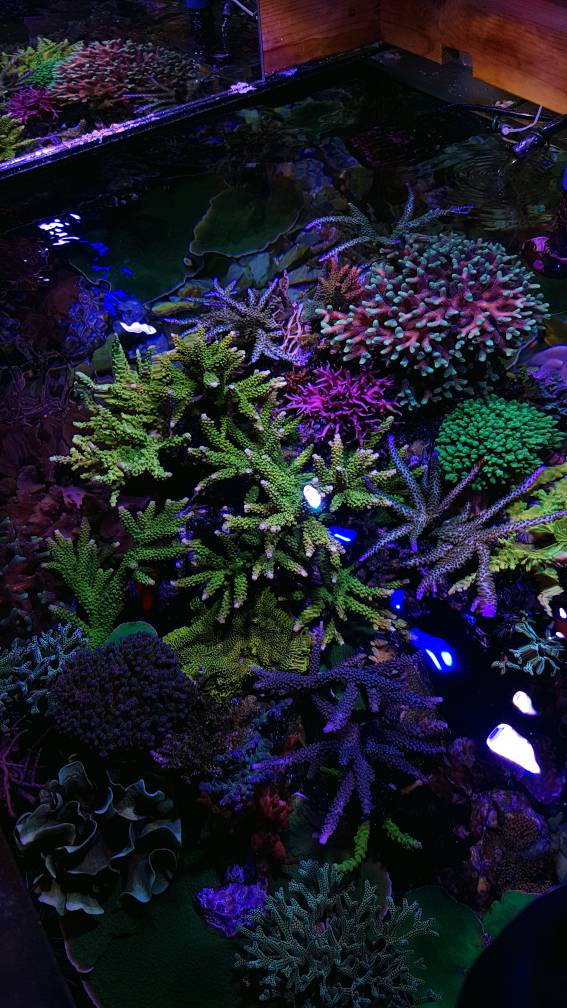
All grown from "coral waste" from my maintank


Another dutch guy with no waterchanges
https://www.reef2reef.com/index.php?threads/300757/
So .... this is how the dutch do it now
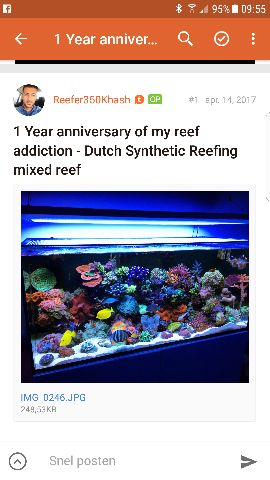
https://www.reef2reef.com/index.php?threads/300757/
So .... this is how the dutch do it now

- Joined
- Apr 29, 2016
- Messages
- 396
- Reaction score
- 372
Hi Glenn,
I just reviewed 10's of pages of the method for DSR reefing. I would like to try it on my humble 151 litre aquarium. I do have some questions however, if you would indulge me:
1. How important in your mind is the original salt mix, can this step be skipped if you already have aged saltwater in the aquarium? If the original recipe is important to the success of the method, would you recommend a complete, or partial water changes to get started?
2. I understand the dosing required and the weekly, bi-monthly measurements and the corrections contained in your spreadsheet, however for things with daily consumption:
Alk, Cal, Mg, I'm assuming you do regular dosing without measuring daily, then if it needs correction, you change the amount you dose regularly vs. one single correction.
3. What do you use specifically for carbon dosing? White Vinegar, Sugar, Vodka? Does the source matter between the three mentioned?
4. You mentioned the importance of mechanical filtration and clean up crews for your sandbed, do you mess with the sand at all or let the critters do their work? Do you occasionally stir up the bed?
Thanks! I look forward to your reply.
I just reviewed 10's of pages of the method for DSR reefing. I would like to try it on my humble 151 litre aquarium. I do have some questions however, if you would indulge me:
1. How important in your mind is the original salt mix, can this step be skipped if you already have aged saltwater in the aquarium? If the original recipe is important to the success of the method, would you recommend a complete, or partial water changes to get started?
2. I understand the dosing required and the weekly, bi-monthly measurements and the corrections contained in your spreadsheet, however for things with daily consumption:
Alk, Cal, Mg, I'm assuming you do regular dosing without measuring daily, then if it needs correction, you change the amount you dose regularly vs. one single correction.
3. What do you use specifically for carbon dosing? White Vinegar, Sugar, Vodka? Does the source matter between the three mentioned?
4. You mentioned the importance of mechanical filtration and clean up crews for your sandbed, do you mess with the sand at all or let the critters do their work? Do you occasionally stir up the bed?
Thanks! I look forward to your reply.
Hi Glenn,
congratulations for your superb way of reefkeeping!
As my tank was almost collapsing i' m right now at that stage at which u have eben a few years ago. At the moment i just leave my tank, and keep it with minimum effort just alive.... I lost too much corals and was very near of quiting the hobby.
But i want to give it a last try, after reading a lot of DSR, favourably with your method.
- is there a guide, or how would u start a tank right from the beginning?
Things to know for starting a new tank:
-live rock/dead rock, any bacteria?
-lighting full from beginning ( 12hours, intensity 100%)
-beginning no nitrate/phosphate dosing, but what if nutrients too low (dead rocks, almost no fish)
-how increase live stock ( first corals, than fish, weekly how much?!)
-when Start dosing what? (time for Nitrate/Phosphate)
-only skimmer and Media Filter (uv only for special Fish )
-how much flow for return pump
-which food for automatik feeder
Maybe when there's time u/ or other DSR users can answer some questions?!
Thank u and happy reefing!
Flo
congratulations for your superb way of reefkeeping!
As my tank was almost collapsing i' m right now at that stage at which u have eben a few years ago. At the moment i just leave my tank, and keep it with minimum effort just alive.... I lost too much corals and was very near of quiting the hobby.
But i want to give it a last try, after reading a lot of DSR, favourably with your method.
- is there a guide, or how would u start a tank right from the beginning?
Things to know for starting a new tank:
-live rock/dead rock, any bacteria?
-lighting full from beginning ( 12hours, intensity 100%)
-beginning no nitrate/phosphate dosing, but what if nutrients too low (dead rocks, almost no fish)
-how increase live stock ( first corals, than fish, weekly how much?!)
-when Start dosing what? (time for Nitrate/Phosphate)
-only skimmer and Media Filter (uv only for special Fish )
-how much flow for return pump
-which food for automatik feeder
Maybe when there's time u/ or other DSR users can answer some questions?!
Thank u and happy reefing!
Flo
Hi Glenn,
I just reviewed 10's of pages of the method for DSR reefing. I would like to try it on my humble 151 litre aquarium. I do have some questions however, if you would indulge me:
1. How important in your mind is the original salt mix, can this step be skipped if you already have aged saltwater in the aquarium? If the original recipe is important to the success of the method, would you recommend a complete, or partial water changes to get started?
2. I understand the dosing required and the weekly, bi-monthly measurements and the corrections contained in your spreadsheet, however for things with daily consumption:
Alk, Cal, Mg, I'm assuming you do regular dosing without measuring daily, then if it needs correction, you change the amount you dose regularly vs. one single correction.
3. What do you use specifically for carbon dosing? White Vinegar, Sugar, Vodka? Does the source matter between the three mentioned?
4. You mentioned the importance of mechanical filtration and clean up crews for your sandbed, do you mess with the sand at all or let the critters do their work? Do you occasionally stir up the bed?
Thanks! I look forward to your reply.
1- no waterchange neccesary , just do the corrections with the calculator.
Original blend stand for the purity of the elements (no harmfull pollution and heavy metals)
2- measure and correct to the setpoint.
- Than determine daily consumption
- dose daily consumption......
Next time you measure it must be near perfect...
3- Special blend developed by own testing. Yes the blend does matter for the final result.
4- use powerfilter is crucial.. no more sandbed cleaning , since i have critters do the job.
Good luck!
Similar threads
-
- AMS: Article
- Replies
- 11
- Views
- 1,257
- Replies
- 18
- Views
- 1,646
- Replies
- 937
- Views
- 27,664
-
- AMS: Article
- Replies
- 34
- Views
- 2,421


















